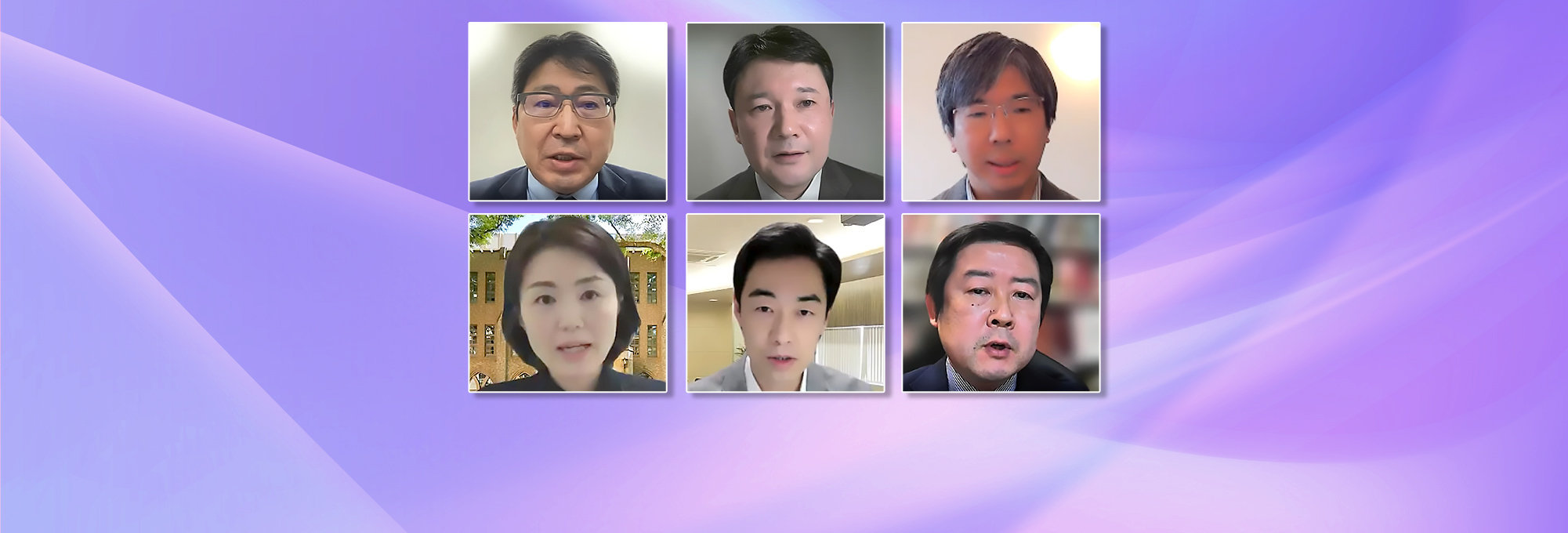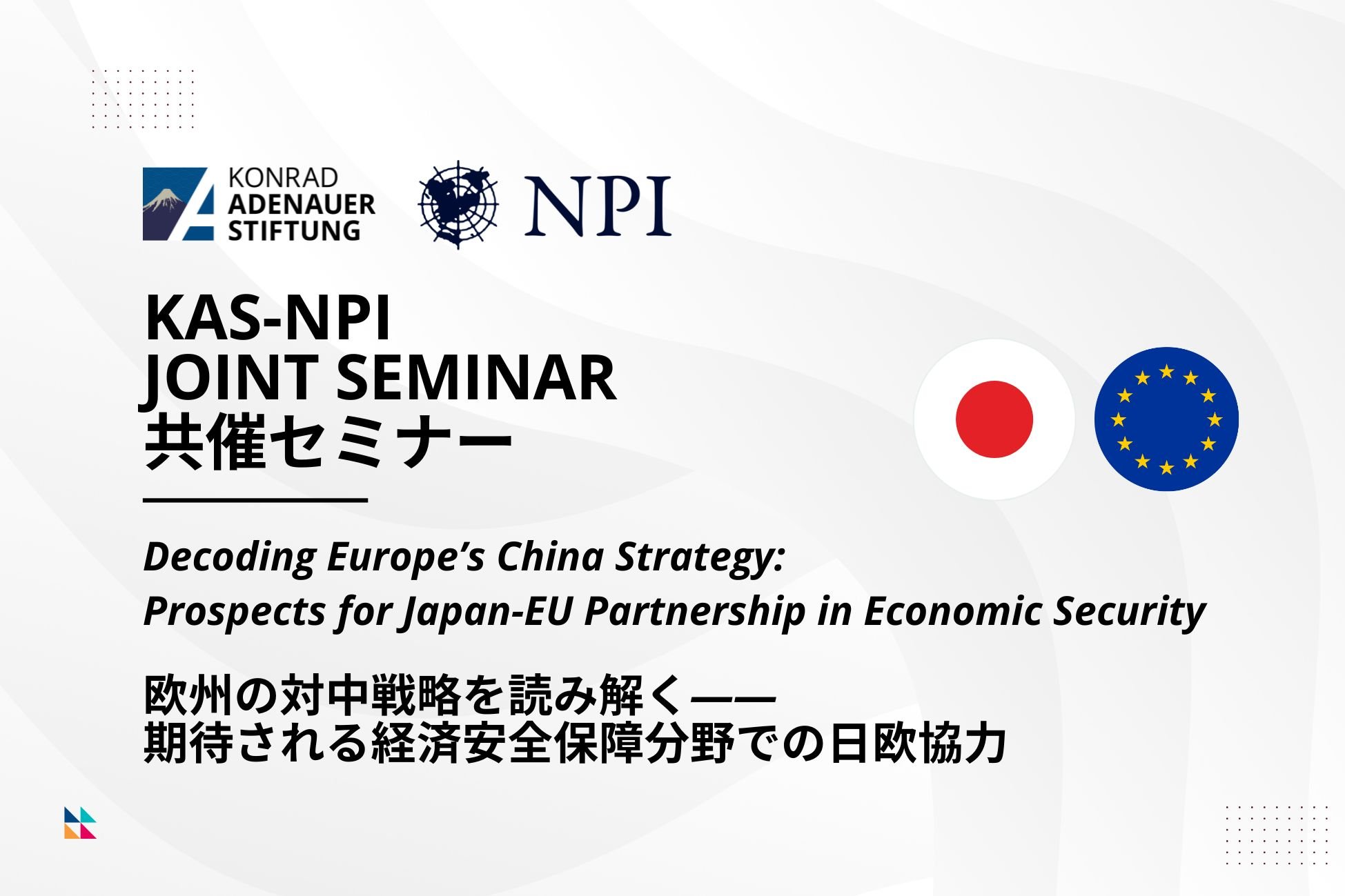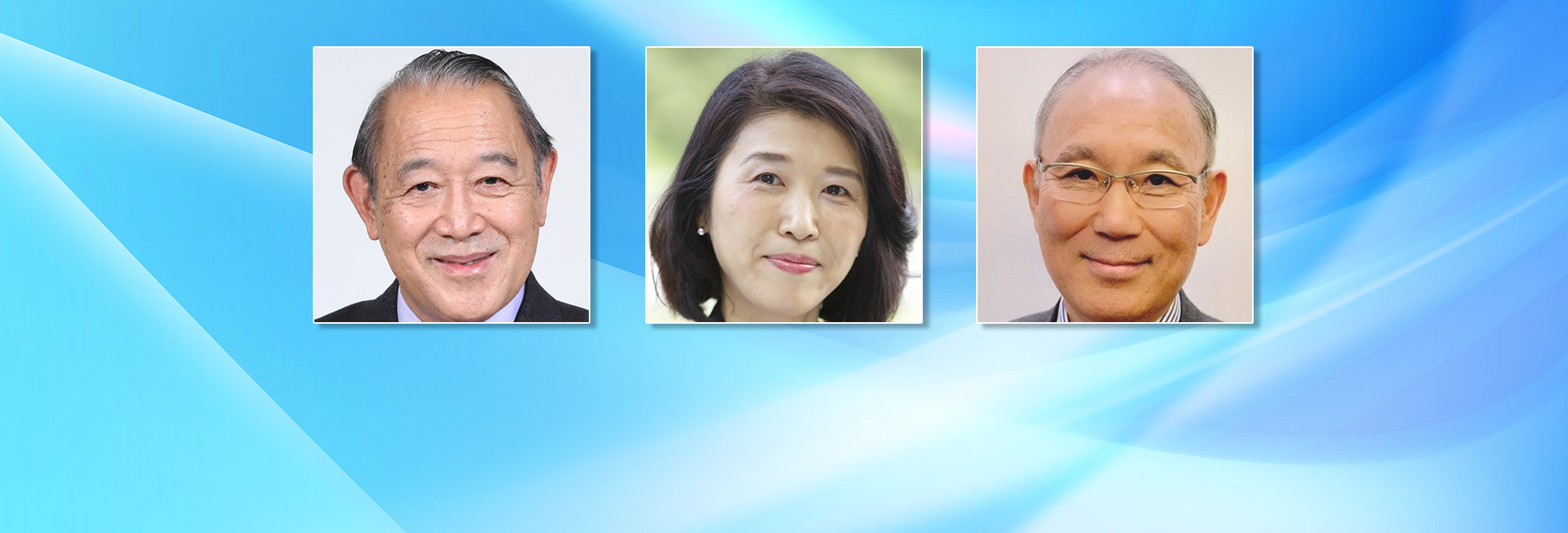2022/04/29
On April 4, 2022, NPI held a webinar, "Russia's Invasion of Ukraine and the Future of the Indo-Pacific. "
On April 4, 2022, NPI held a webinar, "Russia's Invasion of Ukraine and the Future of the Indo-Pacific. " Leading scholars with expertise in politics and diplomacy in each region discussed 1) the outlook of Russia's military and diplomacy, 2) the views of European countries, China, South Korea and North Korea, and the U.S., 3) the impact of the war in Ukraine on the Indo-Pacific region.
Time and Date: 17:00-18:30, April 4, 2022
Theme: "Russia's Invasion of Ukraine and the Future of the Indo-Pacific"
Moderator: Kawashima Shin, Executive Director of Research, NPI; Professor, Graduate School of the University of Tokyo
Panelists:Hyodo Shinji, Director, Policy Studies Department, National Institute for Defense Studies, Ministry of Defense: From a Russian Perspective
Hosoya Yuichi, Senior Fellow, NPI; Professor, Keio University: From a European Perspective
Eto Naoko, Visiting Fellow, NPI; Professor, Gakushuin University: From a Chinese Perspective
Nishino Junya, Senior Fellow, NPI; Professor, Keio University: From a Korean Peninsula Perspective
Mori Satoru, Senior Fellow, NPI; Professor, Keio University; From a U.S. Perspective
Many people from the Ministry of Foreign Affairs, various government agencies, universities, corporations, and mass media participated in the event. At the beginning of the session, NPI President Mr. Fujisaki Ichiro raised the issue, "We should recognize that a tyrannical state may use force if necessary. Russia is reportedly struggling in the battle, but we need to keep a close eye on the future course of the negotiations; just as there was a Summer Campaign in the wake of the Osaka Winter Campaign." The moderator, NPI Executive Director of Research Dr. Kawashima Shin, posed the following questions to each speaker.
1. How does each region/country view the invasion of Ukraine? How do you think it will be settled?
2. Do you think the world order will change significantly in the future?
■ The following is a summary of the discussion. (April 4, 2022)
1. How does each region/country view the invasion of Ukraine? How do you think it will be settled?
Russia Perspective
In addition to Russia's strong concerns that Putin's authoritarian regime is being threatened by a wave of democratization, Russia has opposed Ukraine's membership in NATO and shown a unilateral intention to bring Ukraine under its own influence.
Now that it has become difficult to control Kyiv, the issues for ceasefire negotiations are being sorted out, but the future of the negotiations is uncertain, and Russia is focused on gaining an advantageous position in the fighting before the talks. Deploying troops under the guise of protection of life and property and self-defense by pro-Russian residents who are reportedly being harmed by the Ukrainian side, recognizing the independence of the Donetsk People's Republic and Luhansk People's Republic, and taking military control by separating the two eastern provinces from Ukraine are elements that could appeal to the Russian people on May 9, 2022, Victory Day. This is considered the minimum war achievement. There is no just cause for the invasion of Ukraine, and there is uncertainty about the "new security framework" demanded by Ukraine and about the status of Crimea.
Europe Perspective
In Europe, different countries have responded differently to the recent Russian invasion of Ukraine. Broadly speaking, they can be divided into the following three groups: (1) the U.K., (2) Germany and France, and (3) Eastern and Northern European countries. The U.K. does not depend on Russian energy resources and has consistently opposed Russia on the grounds that "NATO will create the post-Cold War order." Germany has been dependent on Russian natural gas since the 2011 Great East Japan Earthquake, when it began to phase out its nuclear power plants. Also, in the 2015 "Minsk-2" agreement, Germany and France made a major concession to Russia regarding the dispute over two eastern provinces in Ukraine, arbitrating an agreement that did not move the border but granted "broad autonomy" to pro-Russian forces. Germany and France are likely to mediate this time as well. Eastern European countries are taking a hardline attitude because of their borders with Russia. The same is also true of the neutral countries in Northern Europe, which have come to declare their membership in NATO.
China Perspective
For China, there are four ties with Russia: (1) Russia is a partner country in the conflict with the U.S.; (2) the two countries engage in economic cooperation, mainly in energy supply; (3) they share the victorious nation's historical perception of "victory in the global anti-fascist war and the China's anti-Japanese war" and subsequent frustration with "unjust treatment by the West"; and (4) they share the value that the international community should be "multi-polar" and more "fair and democratic."
On the other hand, there is a discrepancy between Russia's and China's intentions on the following three points. (1) While Russia seeks to "regain lost ground," China wants to achieve a position of international authority as a major power. (2) China repeatedly refers to respect for national sovereignty and territorial integrity, and it places particular emphasis on respect for sovereignty as a basis for asserting "non-interference in internal affairs." Therefore, while providing support for the humanitarian crisis in Ukraine, China carefully avoids pointing out Russia's responsibility for it. It also does not mention the recognition of the "independent states" of Donetsk and Luhansk. (3) The Treaty on Friendship and Cooperation Between China and Ukraine protects Ukraine, a non-nuclear-weapon state, from nuclear threat, and the Statement on the Provision of Security Guarantees for Ukraine (December 1994) guarantees Ukraine's security, so China is essentially obligated to protect Ukraine.
As a settlement point, China would prefer to be involved in ceasefire negotiations, even if only in form, as various treaties and agreements with "One Belt, One Road" related countries may lose their meaning if the Treaty on Friendship and Cooperation Between China and Ukraine is left unresolved. However, China cannot approve the "independence" of the two eastern provinces and would like them to be limited to a "high degree of autonomy." It is clear that China cannot come to terms with Russia's claims on this point, and it will not move unless the situation changes.
Korean Peninsula Perspective
Both South Korea and North Korea are pairing / associating the current situation in Ukraine to the Korean Peninsula's unique history of being at the mercy of great power politics and are raising awareness of their own security as they watch the situation unfold. The new South Korean administration will move to deepen the alliance with the U.S. and discuss nuclear sharing. The Korean Peninsula is watching the balance in the new Cold War structure of the southern triangle (Japan-U.S.-South Korea) and the northern triangle (China-Russia-North Korea), focusing on the U.S.-China confrontation, respectively. North Korea, seeing that the U.N. is not functioning well, is likely to move to strengthen its "nuclear war deterrence" as they claim.
Regarding the direction of a settlement, South Korea does not want a settlement in a way that would diminish U.S. international influence. North Korea, on the other hand, hopes the opposite will happen. China's attitude will be closely watched. The question is, "Is there any possibility of cooperation between the U.S. and China, even to a limited extent?" North Korea knows that it is in its best interest to have at least either China or Russia on its side.
U.S. Perspective
The U.S. will not deploy troops directly to Ukraine, but will concentrate on three points by strengthening 1) military assistance, 2) economic sanctions, and 3) the defense systems of NATO countries, with the goal of causing Russia to change its behavior. It sees the war as protracted, and while supporting Ukraine, the US will avoid escalation and the posture of helping Ukraine to win terms favorable to itself. If NATO and Russia were to be in direct conflict, it would be difficult to take the risk of a nuclear war, and, if such a situation should occur, it would be judged to ultimately benefit China. The U.S. recognizes that using force will not bring good results. The frustration of not being able to take decisive action has not led to an increase in President Biden's approval rating. Economic dissatisfaction, such as high resource prices, is also increasing. With no concrete measures to resolve the situation, the outcome of the midterm elections will be harsh.
2. Do you think the world order will change significantly in the future?
It is true that some European countries, in the wake of the recent invasion of Ukraine, are of the opinion that "the problems of the European region must be given higher priority than those of the Indo-Pacific region." On the other hand, discussing the issue calmly, it is likely that China's power will increase now that Russia's total victory is in jeopardy. In other words, there is a view that Russia will become more dependent on China, and China's growing power will further accentuate the structure of the U.S.-China rivalry.
From the U.S. perspective, Russia is a serious threat and China a serious competitor. Since Russia is expected to weaken in the long run, the U.S. is expected to shift its strategy to focus on China. The shift of U.S. forces to the Indo-Pacific will not be significantly impeded as U.S. forces will not be deployed to Europe on a large scale at this time. Conscious of competition with China, the U.S. has formed coalitions by functional sector, but the latest sanctions against Russia also use the instrument of export controls, and, with regard to technology, the U.S. will strengthen its cooperation with Europe and deepen its division with China and Russia.
China sees no change in the composition of the U.S.-China confrontation. However, it views as problematic the fact that the invasion of Ukraine has increased the unity of Europe and strengthened its solidarity with the U.S. It has encouraged the E.U., which will suffer economically, to form an "independent perception of China" and to consider cooperation with China, thereby separating itself from the U.S. It is also keeping a close eye on India, which could influence Russia's weakening in the medium- to long-term.
The conservative party's victory in the presidential election has led to South Korea's stance of strongly joining together with Western countries and simultaneous claims of stronger relations with liberal democracies. The situation in Ukraine has something in common with the history of the Korean Peninsula in terms of the conflict between liberalism and authoritarianism. Therefore, the arguments of the progressive forces are unlikely to have much persuasive power, and it is likely that South Korea's diplomacy and security policies will be steered toward strengthening ties with the U.S. On the other hand, it is also anticipated that domestic opinion will be voiced that strengthening ties with the U.S. may lead to military provocation by North Korea.
Russia may become isolated and "North Koreanized" in the international community in the future. Economic sanctions have reduced its national power and pushed it to the brink of economic collapse, and, as a result, the Putin administration's political base is shaking. For Russia, China is the only recourse, and it may become China's junior partner. However, the China-Russian relationship over Ukraine is not simple. China and Russia may have conflicting interests over Ukraine. Although the speaker agrees with the opinion that the invasion of Ukraine will not affect the larger structure of the U.S.-China confrontation, whether Russia will take the position of China or whether it will distance from China to result in a position that is not directly involved in the U.S.-China confrontation remains an issue that will require close monitoring.






